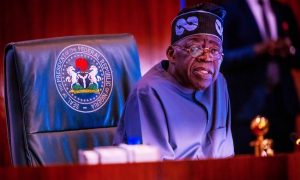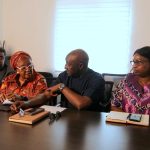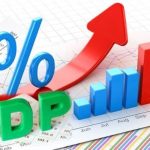Onome Amuge
Two years into President Bola Tinubu’s administration, financial analysts assert that Nigeria’s economic landscape presents a complex paradox. While bold reforms have ushered in a semblance of stability, particularly in the volatile foreign exchange market, their transformative impact on real sector growth remains largely subdued.
The initial uncertainty that blanketed the economy in May 2023, following the current administration’s assumption of office, appears to have receded. However, its ghost, as some analysts describe it, persists, manifesting in unrelenting inflationary pressures that erode the t efforts of monetary authorities and continue to squeeze the disposable income of average Nigerians.
Despite the federal government’s consistent announcements of key milestones and endorsements from international financial institutions, a deeper analysis into critical sectors reveals that though progress is evident in certain areas, yet it is often shadowed by persistent pitfalls and the enduring challenge of translating macroeconomic adjustments into tangible improvements for citizens battling a soaring cost of living. Further complicating this narrative is the nation’s renewed appetite for external borrowing, raising concerns about fiscal sustainability and the potential for a precarious debt trajectory.
Banking sector: A return to capital fortification
One of the most defining policy interventions in the banking industry came in March 2024, when the CBN unveiled a mandatory bank recapitalisation programme. This directive compels all commercial banks to increase their minimum capital bases within a two-year timeframe. While the industry had received prior signals of an impending recapitalisation in November 2023, the precise new thresholds sent ripples across the sector. Under the revised guidelines, international banks are now mandated to achieve a N500 billion capital base, national banks N200 billion, and regional banks N50 billion.
This aggressive recapitalisation drive is integral to the administration’s ambitious target of a $1 trillion economy. Its primary design is to fortify banks against systemic shocks, particularly in light of the severe macroeconomic turbulence that followed the naira’s substantial devaluation. Since mid-2023, the local currency has shed nearly 70 percent of its value, a consequence largely attributed to the CBN’s unification of exchange rates and the liberalisation of the foreign exchange market, considered a cornerstone of President Tinubu’s initial reforms.
Beyond the recapitalisation push, a pivotal shift under the Tinubu administration has been the change of guard at the apex bank. Governor Yemi Cardoso, who assumed office in September 2023 following the suspension of Godwin Emefiele, has notably ushered in a return to policy orthodoxy, reversing years of what many described as opaque interventions by his predecessor.
In a concerted effort to curb runaway inflation and stabilise the financial system, the CBN’s new leadership has adopted a decidedly hawkish stance. Under Governor Cardoso, the Monetary Policy Rate (MPR) has been aggressively hiked, moving from 18.75 percent to 22.75 percent. Alongside these interest rate increases, the CBN also raised the Cash Reserve Ratio (CRR) for commercial banks from 32.5 percent to 50 per cent, and for merchant banks from 10 per cent to 16 percent. These stringent measures have tightened liquidity across the financial system, with knock-on effects on credit availability to the real sector.
Despite the stringent liquidity management, the CBN has reported a welcome uptick in foreign reserves. These reserves rose from $35.094 billion as of May 30, 2023, to $38.552 billion as of May 22, 2025. This increase is attributed to improved foreign exchange inflows from oil receipts and remittances, boosted by enhanced transparency in the forex market.
Assessing the past two years, Ayokunle Olubunmi, head of financial institutions ratings at Agusto & Co, pointed to policies that have generated negative effects on the economy. “The elevated cash reserve debits have adversely impacted the industry’s liquidity and funding costs,” Olubunmi noted, adding that inflationary pressure and steep naira depreciation have substantially increased operating costs for many corporations, particularly manufacturers.
Furthermore, Olubunmi noted that the naira devaluation has bloated the asset base of banks, leading to an impact on regulatory costs such as the AMCON levy. He also observed that asset quality pressures have mounted as obligors struggle with harsh economic realities. On a more optimistic note, he conceded that the various policies have cumulatively produced a relatively predictable and stable regulatory environment, coupled with what he described as a more understanding and listening central bank.
Capital Market: Bullish run welcomes renewed investor confidence
According to market analysts, the Nigerian capital market has been a standout performer under the Tinubu administration. This is as market capitalisation gained N41.5 trillion within two years, escalating from N28.845 trillion at the start of trading on May 30, 2023, to N70.377 trillion as of May 27, 2024. Correspondingly, the Nigerian Exchange (NGX) Limited All-Share Index (ASI) witnessed an 84.27 percent increase, climbing from 52,973.88 points on May 26, 2023, to reach 111,606.22 points on May 27, 2024.
Ahead of the second-year anniversary, key shareholder groups voiced their approval, asserting that President Bola Tinubu’s economic reforms have played a crucial role in stabilising the economy and restoring investor confidence in Nigeria’s long-term prospects.
Faruk Umar, president of the Association for the Advancement of Rights of Nigerian Shareholders (AARNS), affirmed that the reforms undertaken by the Tinubu government have directly and indirectly improved the investment environment.
Umar, who holds board positions in numerous companies, commended President Tinubu for demonstrating a commendable awareness of the challenges plaguing the Nigerian economy and articulating clear pathways to their resolution. He acknowledged that while the reforms have necessarily brought some negative consequences for citizens and companies, such as increased prices of goods and services and foreign exchange losses for businesses, they have nonetheless helped to reset the economy’s fundamentals and position the country for sustainable growth.
He pointed to the stability in the forex market, the near-attainment of a single-window forex market, the return of foreign investors, and an increase in foreign participation at the Nigerian stock market as clear indicators of the economic reforms’ success. The sustained positive performance of the Nigerian stock market since the advent of this government, he noted, underscores robust investor confidence, affirming the stock market’s traditional role as a barometer of economic direction.
Umar further noted that the banking recapitalisation initiative has not only fortified banks, which boast some of the largest shareholder bases in the country, but has also deepened the stock market. He expressed optimism that recent data suggesting inflation is decelerating will be further supported by ongoing initiatives in the agricultural sector and improvements in national security, which should collectively drive down commodity prices.
Government’s narrative vs. citizen reality
The federal government has repeatedly highlighted what it terms key milestones as evidence of its economic realignments. These include an increase in government revenue, which it claims has been channelled into large-scale infrastructure projects such as the Lagos-Calabar Coastal Highway and the Sokoto-Badagry Superhighway. Oil production has reportedly risen to 1.61 million barrels per day, with over $500 million in foreign direct investments secured. A Compressed Natural Gas (CNG) initiative, championed by President Tinubu, is projected to save over N2 trillion monthly by cutting petrol imports.
Social intervention programmes have also been rolled out. These include N95.6 billion approved for the Student Loan Scheme, over N200 billion allocated to the newly established Consumer Credit Corporation, and N570 billion disbursed to states for livelihood support. Other highlights encompass a new national minimum wage of N70,000, increased NYSC allowances from N33,000 to N77,000, and tariff waivers on food and pharmaceutical imports.
Despite these asserted achievements, experts argue that a wide gap persists between policy intent and the lived experiences of most Nigerians. Headline and food inflation, coupled with heightened insecurity across states and the FCT, have become the worrisome realities for a majority of the populace, as corroborated by several surveys, including the National Bureau of Statistics’ Crime Experience and Security Perception Survey (CESPS) for 2024.
Security and agriculture: challenges remain unsolved
In the security sector, Kabir Adamu, CEO of Beacon Security & Intelligence Ltd, noted that while the government cites operational successes against terrorists, bandits, and kidnappers, with thousands reported killed or arrested, data reveals a troubling rise in abductions and violent attacks nationwide. He cautioned that federal efforts would remain fragile without stronger local policing, functional state-level security architecture, and tangible progress on long-delayed initiatives such as state police and local government autonomy. Adamu commended presidential directives like the recruitment of 129,000 forest guards but stressed that national security would remain rhetorical unless top-level reforms translate into concrete community-level impact. “What Nigeria needs is a comprehensive, community-driven, and well-funded security strategy,” he said.
In agriculture, stakeholders lamented persistent food insecurity despite the administration’s support programmes. Kabiru Ibrahim, president of the All Farmers Association of Nigeria (AFAN), noted that insecurity, climate change, and low mechanisation continue to undermine food production, often forcing the government to resort to temporary import windows, as seen between July and December 2024.
“Ordinarily, we should see an increasing availability of food, but due to many inhibitors like insecurity, climate change, and low mechanisation, we are still experiencing gaps that sometimes necessitate windows of import, such as what we had between July and December 2024. We hope things will change shortly because of the several windows of support and the increased effort in the fight against insecurity,” he stated.
On the political front, analysts expressed concern over early 2027 campaign activities, urging President Tinubu to prioritise governance in the remaining months of his first term. They stressed that verifiable improvements in citizens’ lives remain the most effective campaign strategy, cautioning against what they termed a crackdown on opposition voices or the pursuit of a one-party state agenda.
Mounting debt: Analysts warn of a fiscal cliff
Recently, attention has shifted to the federal government’s renewed external borrowing drive, which has reignited conversations around Nigeria’s fiscal sustainability. Amidst a rapidly rising debt profile, the government appears to be treading a delicate path, one that may keep the country perched on a fiscal cliff, analysts warn.
Recently, President Bola Tinubu submitted a fresh request to the National Assembly, seeking approval for over $21.5 billion in external loans as part of the government’s 2025–2026 Borrowing Plan. This request is intended to plug financing gaps and support ambitious economic growth targets. Alongside this substantial plan, the government is also pursuing additional borrowings amounting to €2.2 billion and 15 billion yen from foreign sources, as well as $2 billion in naira-denominated debt from the domestic market.
In total, these new borrowings are expected to account for roughly 60 per cent of the total spending outlined in the proposed 2025 budget, signaling a shift in strategy. While the government had previously highlighted its intention to pivot towards foreign direct investments (FDI) and attract equity investors to reduce reliance on debt, the latest borrowing plans appear to contrast sharply with that narrative. This increased borrowing appetite raises the cost of credit and places increased pressure on fiscal stability.
According to official disclosures, the borrowing plan targets strategic sectors such as infrastructure, agriculture, health, education, water supply, security, financial and monetary reforms, as well as job creation and growth support. The proposed borrowing strategy is embedded within the broader Medium-Term Expenditure Framework (MTEF), in accordance with the Fiscal Responsibility Act (2007) and the Debt Management Office (DMO) Act (2003).
Recent data from the DMO reveals that Nigeria’s total public debt stood at $94.23 billion (N144.67 trillion) as of December 2024, compared to $108.23 billion (N97.23 trillion) a year earlier. Analysts observed that this apparent dollar decline was largely driven by the devaluation of the naira rather than actual reductions in underlying debt levels. External debt service alone amounted to $4.66 billion in 2024, comprising $2.80 billion in principal repayments, $1.74 billion in interest payments, and $120.13 million in various charges such as fees and commissions. Breaking this down by creditor groups, multilateral lenders received the largest share of repayments ($2.62 billion), followed by commercial lenders ($1.47 billion), while bilateral creditors accounted for $570.67 million. The latter category often reflects higher concessional terms but can come with elevated administrative and embedded costs.
For context, since assuming office in May 2023, the Tinubu administration has already secured $7.2 billion in external loans, entirely from the World Bank. These funds have been channelled toward a mix of socio-economic projects, including $750 million for power sector recovery, $500 million for women empowerment, $800 million for social safety nets, and $700 million to support adolescent girls’ education. The largest tranche, $2.25 billion, was secured in June 2024 for economic stabilisation efforts, including macroeconomic reforms and fiscal rebalancing. An additional $1.57 billion was scheduled for disbursement in September 2024 to fund health, education, and power projects, while $632 million is expected in March 2025 for nutrition and human capital development.
Despite these well-intentioned allocations, Cowry Research notes that the government’s escalating borrowing appetite remains a source of concern, particularly as a substantial portion of the loans (both current and proposed) will go toward financing recurrent and capital expenditures without a corresponding increase in sustainable revenue streams.
Cowry Research also noted that the current decline in global oil prices below the $75 per barrel benchmark further clouds Nigeria’s revenue outlook, especially given the heavy reliance on oil for budgetary support.
However, while the administration frames these loan programmes as catalysts for long-term development, serious questions persist around fund utilisation, project outcomes, and overall fiscal transparency.
Cowry Research asserted that without robust accountability and sustainability frameworks, even development-focused borrowing could compound Nigeria’s economic vulnerabilities. Furthermore, it warned that the composition of Nigeria’s debt portfolio remains lopsided, with a high concentration of liabilities at the federal level and an imbalanced mix between external and domestic debts.
“Although Nigeria’s debt-to-GDP ratio remains within the DMO’s prescribed threshold, the true fiscal threat lies in the country’s surging debt servicing costs and the absence of aggressive, diversified revenue strategies.
“Ultimately, Nigeria’s borrowing trajectory must be weighed against the country’s capacity to generate revenues, absorb new debt sustainably, and deliver economic returns that justify the rising cost of credit,” it concluded.









